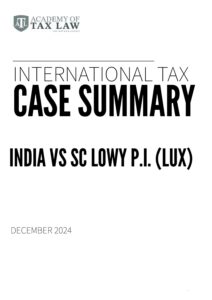India vs SC Lowy P.I. (Lux): CASE SUMMARY
Home » Case Library »
India vs SC Lowy P.I. (Lux): CASE SUMMARY
Case Information
- Court: Income Tax Appellate Tribunal, Delhi Bench ‘D’, New Delhi
- Case No: ITA No. 3568/DEL/2023
- Applicant: SC Lowy P.I. (Lux) S.A.R.L., Luxembourg
- Defendant: Assistant Commissioner of Income Tax, International Taxation, Circle 3(1)(2), Delhi
- Judgment Date: 30 December 2024
- Download the FULL JUDGMENT
Judgment Summary
The judgment in SC Lowy P.I. (Lux) S.A.R.L. vs Assistant Commissioner of Income Tax (ACIT) revolved around the denial of treaty benefits under the Double Taxation Avoidance Agreement (DTAA) between India and Luxembourg. The central issue was whether the appellant, a Luxembourg-based entity, was entitled to these benefits, given allegations by the tax authorities of treaty shopping, lack of economic substance, and non-beneficial ownership.
The applicant, a Category II Foreign Portfolio Investor (FPI) registered with the Securities and Exchange Board of India (SEBI), declared income from various Indian investments for the 2021–22 assessment year. These included capital gains, business income, and interest income. The tax officer denied the claimed exemptions under the DTAA, asserting that the appellant was a conduit entity with no significant commercial presence in Luxembourg. Key claims included that the appellant was controlled by shareholders in other jurisdictions (notably the Cayman Islands), lacked commercial rationale for being based in Luxembourg, and failed to demonstrate sufficient substance or beneficial ownership.
The tax authorities recharacterised the income and applied higher tax rates, citing provisions under domestic Indian tax laws instead of the DTAA. The core contentions included:
- Business income from securitisation trusts being taxable as interest income.
- Denial of capital gains tax exemptions on securities sales.
- Recharacterisation and higher taxation of interest income from investment funds.
The appellant argued that it was a bona fide tax resident of Luxembourg, supported by a valid Tax Residency Certificate (TRC) and compliance with Luxembourg’s tax regime. It contended that treaty benefits could not be denied based on unsubstantiated assumptions of tax avoidance. Citing judicial precedents, it challenged the Revenue’s stance, highlighting a lack of evidence for fraud, sham transactions, or absence of economic substance.
The Tribunal analysed the appellant’s corporate structure, tax residency, and compliance with DTAA provisions. It considered whether the Principal Purpose Test (PPT), introduced via the Multilateral Instrument (MLI), applied. The Tribunal also reviewed whether the appellant demonstrated genuine economic activity in Luxembourg and beneficial ownership of the income.
Ultimately, the Tribunal upheld the Revenue’s decision, denying treaty benefits. It concluded that the appellant’s setup lacked commercial rationale, primarily facilitating tax avoidance through treaty shopping. The ruling also emphasised that a TRC alone does not conclusively establish treaty eligibility, particularly under the PPT framework introduced by the MLI.
This judgment underscores the critical importance of demonstrating substance, commercial purpose, and beneficial ownership in cross-border investments. It serves as a cautionary tale for multinationals relying on treaty benefits without robust tax structures and compliance frameworks.

